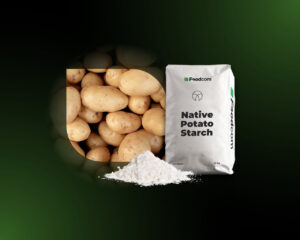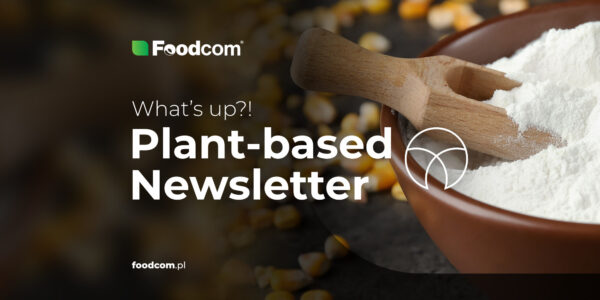- Potato protein demand rises in the plant-based food sector, though high costs remain a barrier.
- Potato starch prices stay elevated due to climatic disruptions and high production costs.
- The potato flake market sees steady growth, driven by increased consumption in vegan and vegetarian diets. Meanwhile, Belgium’s early potato harvest caused a steep price drop, while Argentina faces a surge in potato prices due to inflation.
Welcome Partners!
Welcome back to our Newsletter!
The potato sector is undergoing significant changes. As the potato harvest begins this month, we can expect a respite in the market as more raw material will be available. However, it is important to remember that, among other things, farmers’ wages have increased in the Netherlands and Germany, which will affect raw material prices.
Demand for potato protein is growing in the plant-based food industry, although production costs remain a challenge. Potato starch prices remain higher due to weather disruptions and expensive extraction methods. Meanwhile, the market for potato flakes continues to grow, driven by the rise of vegan and vegetarian consumers.
Let’s see what else has happened recently in the dairy market!
Potato protein
As of August 2024, demand for potato protein continues to grow, particularly due to its applications in the plant-based food industry. The protein, especially the functional form patatin, is in high demand for plant-based dairy products, meat substitutes and other health-conscious foods. Growing demand is driven by consumer preference for allergen-friendly, sustainable, plant-based proteins.
Supply-side challenges remain, however. Functional patatin remains expensive to produce, with prices exceeding $50-100 per kilogram due to the high cost of extraction and drying infrastructure. These high prices make it unaffordable for smaller companies, limiting the widespread use of patatin in everyday food production.
Potato starch
The potato starch market continued to experience significant price increases due to a combination of factors. Global demand for potato starch remains strong, driven by its use in the food, pharmaceutical and packaging industries. This high demand is compounded by supply chain challenges and climate disruptions, particularly in China, where extreme weather events such as floods and heat waves have severely affected potato yields.
These disruptions have reduced the supply of raw potatoes, raising costs for starch producers. As a result, potato starch prices are expected to remain high until the end of the year. In Europe, economic recovery and increased consumer confidence are adding pressure to an already tight market, further raising prices.
Moreover, the cost of producing potato starch remains high due to costly extraction processes and logistical hurdles, making it difficult for smaller producers to compete. This has led to cautious market forecasts, with prices expected to remain high as supply tries to keep up with rising demand.
Potato flakes
The market for potato flakes is experiencing steady growth, driven by rising demand for prepared meals, especially in the foodservice industry. Organic potato flakes are facing a critical shortage, with extremely limited availability due to severe difficulties in sourcing raw materials. As more consumers are adopting vegan and vegetarian diets, demand for potato flakes has increased, given their use as a thickening agent in soups, sauces and other products. Japan and China, in particular, have seen growing interest in mashed potatoes and other potato-based dishes, further boosting demand.
Despite this growth, the market faces challenges, such as fluctuations in the quality of raw potatoes, which can affect the final product. Weak potatoes can lead to lower-quality flakes, which can damage a brand’s reputation. In addition, potato flakes are competing with alternative thickening agents such as arrowroot and cornstarch.
What else?
Belgium
The first early potatoes harvested in Belgium caused a 60% decrease in prices for processing potatoes, bringing them down to €250/ton. This decline is due to increased supply as early crops hit the market. Export Challenges: Belgian potato exports have decreased by 17%, driven by competition from other potato-exporting countries like India and China.
Argentina
Price Surge: In Buenos Aires, potato prices nearly doubled in recent months, experiencing a 100% increase due to inflation and reduced supply. This has caused potatoes to become one of the most expensive staple foods in the country. Agroecological Growth: Argentina is also seeing growth in agroecological potato production, with a small but increasing portion of its 70,000-80,000 hectares dedicated to eco-friendly farming practices.

![Potato market insights: rising demand, price trends, and key challenges [64th Edition of Foodcom PLANT-BASED Newsletter] Potato market insights: rising demand, price trends, and key challenges [64th Edition of Foodcom PLANT-BASED Newsletter]](https://foodcom.pl/wp-content/uploads/2023/08/Foodcom_Plant-Based_Newsletter-1520x760.jpg)


![Grains and roots: coffee, potatoes and tapioca in the spotlight [63rd Foodcom PLANT-BASED Newsletter] Grains and roots: coffee, potatoes and tapioca in the spotlight [63rd Foodcom PLANT-BASED Newsletter]](https://foodcom.pl/wp-content/uploads/2024/06/Foodcom_SA_Plant-Based_Newsletter_3-600x300.jpg)


